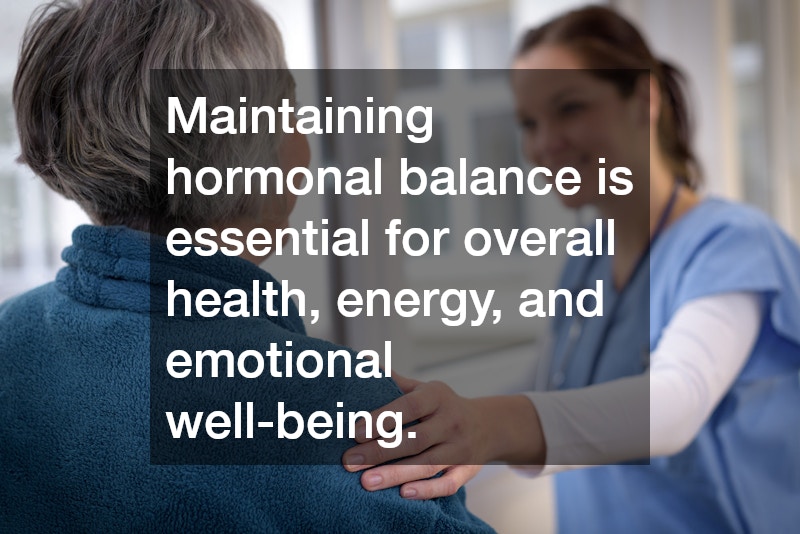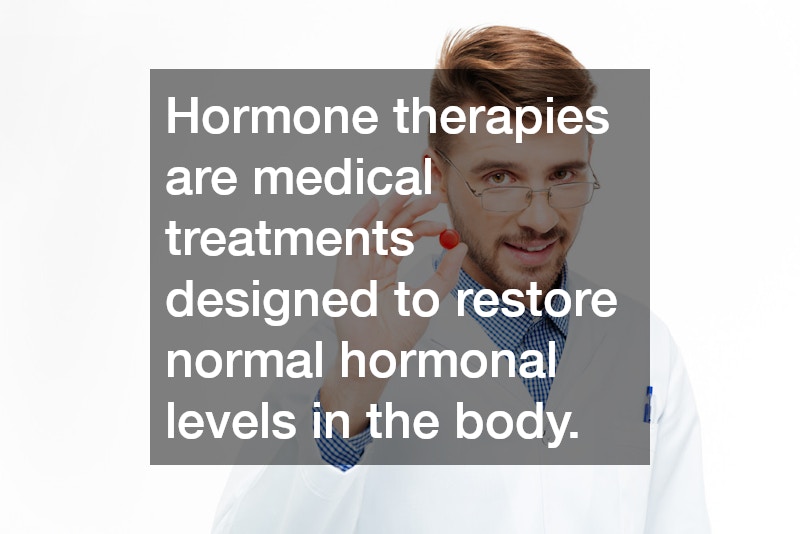Maintaining hormonal balance is essential for overall health, energy, and emotional well-being. As women go through different life stages—puberty, pregnancy, perimenopause, and menopause—their hormone levels naturally fluctuate, leading to physical and emotional changes. These shifts can affect mood, metabolism, sleep quality, and even cognitive function. When these imbalances persist, seeking help from a hormone clinic for women becomes vital.

Personalized Care Through Hormone Therapies
Hormone therapies have become a cornerstone of modern healthcare for women, offering customized treatment plans designed to restore equilibrium and vitality. Beyond treating symptoms, these therapies address the underlying causes of imbalance, supporting long-term health and wellness. With guidance from medical professionals, women can regain energy, reduce discomfort, and enjoy a renewed sense of balance.
Modern Lifestyle Factors That Disrupt Hormonal Balance
In today’s fast-paced world, lifestyle stressors, poor diet, and lack of sleep can disrupt the body’s delicate hormonal harmony. Factors such as environmental toxins, birth control use, and even chronic conditions like thyroid disorders or polycystic ovary syndrome (PCOS) further contribute to irregular hormone levels. The effects can manifest as weight fluctuations, fatigue, anxiety, irritability, and diminished focus—issues that many women mistakenly accept as part of aging or daily stress. However, with the help of a qualified hormone clinic for women, these symptoms can often be reversed or effectively managed.
Modern hormone clinics take a holistic approach, combining medical expertise with individualized care. Practitioners assess each patient’s hormonal profile, often through advanced testing methods similar to those used in a chemical analysis lab, to pinpoint specific deficiencies or excesses. From there, customized hormone therapies are developed to restore natural balance. These treatments may include bioidentical hormone replacement, nutritional guidance, and lifestyle modifications aimed at improving sleep, metabolism, and mental clarity.
Many clinics also emphasize the connection between physical and hormonal health, often recommending supportive treatments such as chiropractic adjustments or stress management practices to enhance overall well-being. The goal isn’t merely to mask symptoms but to help women achieve a stable, sustainable sense of vitality. When hormones are balanced, everything from mood and energy to skin health and immune function can improve, allowing women to feel more like themselves again.
Ultimately, hormone therapy represents empowerment—offering women the ability to take charge of their health, understand their bodies, and embrace every stage of life with confidence. A trusted hormone clinic for women serves as a partner in this journey, guiding patients toward optimal wellness and renewed energy through safe, effective, and personalized care.
1. What Are Hormone Therapies and How Do They Work?
Hormone therapies are medical treatments designed to restore normal hormonal levels in the body. These therapies are particularly beneficial for women experiencing hormonal deficiencies or excesses that disrupt daily life. When hormone levels become unbalanced—whether due to menopause, thyroid disorders, or chronic stress—the body can experience a wide range of symptoms, including fatigue, mood swings, weight gain, or reduced libido.
A hormone clinic for women focuses on identifying these imbalances through comprehensive lab testing and medical evaluations. Once a clear picture of a patient’s hormonal profile is established, practitioners create tailored treatment plans that may include bioidentical hormone replacement therapy (BHRT), dietary recommendations, or lifestyle changes. BHRT uses compounds that mimic the body’s natural hormones, allowing for smoother absorption and fewer side effects than synthetic alternatives.
Hormone therapies can target various hormones, including estrogen, progesterone, testosterone, thyroid hormones, and cortisol, depending on the individual’s needs. For example, estrogen therapy can alleviate hot flashes and bone loss during menopause, while progesterone helps regulate mood and sleep. Similarly, thyroid hormone replacement may enhance metabolism and energy levels, improving overall vitality.
The ultimate goal of hormone therapy is not just symptom relief but the restoration of balance and well-being. By addressing the root causes of hormonal disruption rather than masking symptoms, women can achieve long-term improvements in both physical and emotional health. For those seeking a holistic approach, integrating hormone therapy with complementary care—such as chiropractic services or nutritional counseling—can provide even more comprehensive results.
1.1 Understanding Hormone Imbalances
Hormonal imbalances can arise from natural aging, stress, lifestyle factors, or underlying medical conditions. Estrogen, progesterone, and testosterone play critical roles in regulating energy, mood, and metabolism. When one or more of these hormones become unbalanced, women may experience fatigue, mood swings, weight gain, or decreased libido.
A hormone clinic for women specializes in identifying the root cause of these imbalances. Using advanced diagnostic testing—similar in precision to the equipment used in a chemical analysis lab—clinicians can assess hormonal levels and design tailored therapies to address deficiencies.
1.2 Mechanisms of Hormone Therapies
Hormone therapies may include bioidentical hormones, which are molecularly identical to those naturally produced by the body. These can be delivered through creams, injections, pellets, or oral medications. The goal is to restore harmony within the endocrine system and ensure optimal communication between hormones and body organs.

Clinics often integrate complementary services to improve treatment outcomes. For example, some practitioners may recommend chiropractic adjustments to enhance circulation and nerve function, which can indirectly support hormonal balance and stress reduction.
1.3 The Impact of Restored Hormonal Balance
When hormones are properly balanced, women often experience improved energy, better sleep, sharper focus, and enhanced emotional stability. Hormone therapy doesn’t just target symptoms—it helps the body operate more efficiently. Many women also report an improved sense of well-being and resilience to stress after undergoing treatment at a hormone clinic for women.
2. Why Do Women Need Hormone Clinics?
2.1 Unique Hormonal Challenges Women Face
Women’s bodies undergo multiple hormonal transitions throughout life, each presenting its own set of challenges. Puberty triggers significant hormonal changes, followed by pregnancy and menopause, which can bring symptoms like fatigue, hot flashes, mood swings, and sleep disturbances.
These fluctuations make ongoing care from a hormone clinic for women essential. Such clinics provide continuous monitoring and adjustments, ensuring that treatment remains effective and safe as the body’s needs evolve.
2.2 Role of Clinics in Personalized Treatment
Unlike one-size-fits-all approaches, hormone clinics design individualized plans. Each woman’s hormonal profile is unique, so professionals conduct detailed assessments, similar to an open MRI test that provides a clear, customized view of the body. By understanding the nuances of a patient’s health, clinicians can adjust hormone dosages and recommend supportive therapies like chiropractic services or nutritional counseling.
2.3 Benefits of Professional Healthcare Support
Professional care ensures that treatments are safe, effective, and aligned with medical standards. Clinics work with specialists in endocrinology and wellness to deliver holistic solutions. Some even collaborate with local chiropractors or wellness centers to provide integrated care that supports physical and hormonal health simultaneously.
3. How Can Hormone Therapies Enhance Energy Levels?
One of the most noticeable benefits of hormone therapy is the restoration of energy and vitality. Hormones play a crucial role in how efficiently our bodies produce and use energy.
3.1 Role of Hormones in Metabolism
Estrogen and thyroid hormones influence how the body metabolizes nutrients, burns fat, and maintains steady energy throughout the day. When these hormones drop, metabolism slows, leading to fatigue and weight gain. Through the guidance of a hormone clinic for women, therapies can re-establish healthy hormone levels that revitalize energy and mental clarity.
Clinicians often recommend pairing hormone treatment with lifestyle support. For instance, proper nutrition, moderate exercise, and complementary therapies such as chiropractic adjustments can further optimize metabolism and enhance energy flow.
3.2 Addressing Chronic Fatigue with Hormone Therapies
Persistent fatigue often stems from underlying hormonal imbalances. Hormone therapy can address chronic fatigue by restoring balance to cortisol, estrogen, and thyroid hormones, which regulate the body’s energy cycle.
Additionally, hormone therapies can improve sleep quality, reducing daytime sluggishness and promoting better focus. Some clinics even offer wellness assessments comparable to evaluations in a chemical analysis lab, ensuring a comprehensive understanding of how hormonal and biochemical systems interact.
3.3 Patient Outcomes and Success Stories
Patients frequently share stories of transformation after receiving therapy. Many regain energy to engage in daily activities, pursue hobbies, and enjoy improved emotional balance. Whether balancing work, family, or aging, these outcomes reinforce the importance of consulting a hormone clinic for women for guided and sustained care.
4. Are There Risks Involved with Hormone Therapies?
While hormone therapies offer significant benefits, it’s important to understand potential side effects and manage them under professional supervision.
4.1 Common Side Effects and How to Manage Them
Temporary side effects may include bloating, mild headaches, or mood changes as the body adjusts to new hormone levels. Most of these symptoms fade as equilibrium is restored. Clinics provide monitoring similar to quality checks in a chemical analysis lab, ensuring dosage accuracy and safety.
4.2 Long-Term Risks and Mitigation Strategies
Over time, improper dosing or unmonitored treatments may lead to complications such as blood clots or cardiovascular issues. That’s why regular follow-up visits to a hormone clinic for women are crucial. Monitoring, testing, and personalized adjustments minimize long-term risks and maximize therapeutic success.
Clinics may also educate patients on lifestyle habits that complement hormone therapy, much like how an assisted living program provides continuous support for residents’ evolving health needs.
4.3 Importance of Professional Monitoring
Hormone balance requires careful and ongoing supervision. Working with licensed healthcare professionals ensures that therapies are adjusted appropriately. Additionally, some clinics promote OSHA training in Spanish for staff, ensuring a safe and inclusive environment for both patients and healthcare workers.
5. What Should You Expect During a Visit to a Hormone Clinic for Women?
5.1 Initial Consultation and Assessment
Your first visit typically begins with a detailed consultation and diagnostic testing. Clinicians assess symptoms, lifestyle factors, and lab results to determine the best approach. The process is thorough, often compared to a detailed scan like an open MRI test, ensuring nothing is overlooked.

Clinics may also review medical history to identify potential interactions between hormones and medications. For women managing multiple health issues, coordination with other professionals—like local chiropractors or primary care doctors—can ensure holistic support.
5.2 Treatment Plans and Regimens
Once results are analyzed, a customized treatment plan is created. Hormones may be prescribed in various forms depending on the patient’s needs. In some cases, chiropractic services or nutritional guidance are integrated into the regimen to support full-body wellness.
Some clinics even partner with professionals from other industries to streamline services. For example, just as a biohazard cleanup service must follow strict safety protocols, hormone clinics maintain rigorous standards to ensure treatment accuracy and patient well-being.
5.3 Follow-Up and Continuous Care
Ongoing care is essential for success. Regular follow-ups help monitor hormone levels and assess progress. Adjustments are made as needed, similar to maintaining an assisted living program, where continuous evaluation ensures residents’ evolving needs are met.
6. How to Choose the Right Hormone Clinic
6.1 Evaluating Credentials and Experience
When selecting a hormone clinic for women, start by researching the credentials of its healthcare providers. Clinics that specialize in women’s hormonal health and offer years of clinical experience provide the most reliable care. Professionals with extensive backgrounds in endocrinology, women’s health, or metabolic science ensure a deeper understanding of hormonal intricacies.
The same diligence applied to selecting a chemical analysis lab for precise results should guide your decision when choosing a hormone clinic. Experience, accuracy, and attention to detail matter.
6.2 Reading Reviews and Patient Testimonials
Testimonials provide valuable insights into patient satisfaction and treatment outcomes. Look for reviews that discuss energy improvement, emotional balance, and staff professionalism.
Some clinics also collaborate with wellness centers that provide chiropractic adjustments, integrating holistic approaches that enhance overall treatment outcomes.
6.3 Considering Location, Costs, and Insurance
Convenience and affordability play significant roles in maintaining ongoing care. Choose a clinic that’s easily accessible and transparent about pricing. For patients managing multiple financial priorities—like paying for health services or finding a diabetic strip for sale—clinics that offer flexible payment plans or insurance options can be particularly helpful.
Patients who travel often may also appreciate clinics that coordinate care remotely, similar to how RV storage facilities offer flexible access to accommodate lifestyle needs.
Hormone therapies have revolutionized how women approach health, balance, and energy restoration. From managing menopause symptoms to improving metabolism and mood, these treatments can dramatically enhance quality of life. However, the key to success lies in finding a reputable hormone clinic for women that prioritizes safety, precision, and ongoing support.
By combining medical expertise with holistic care—sometimes including complementary practices like chiropractic services and nutrition counseling—women can achieve sustainable results. Clinics that uphold the same precision and safety standards as a chemical analysis lab or biohazard cleanup service ensure that each treatment is both effective and secure.
Ultimately, investing in hormone therapy is an investment in vitality and longevity. With proper guidance, continuous monitoring, and a trusted hormone clinic for women, achieving renewed energy, emotional balance, and lifelong wellness is not only possible—it’s empowering.

